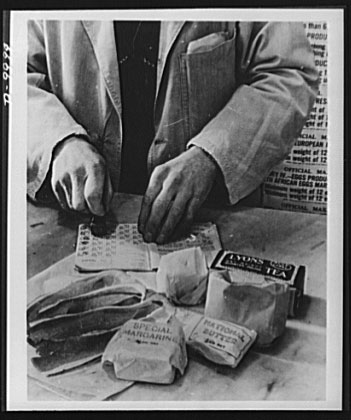 In writing the various Bunch Courtney books food and drink often seemed to play an important part. The discussions between Bunch and various characters sometimes take place over the traditional cup of tea and yet we all know that tea was rationed from July 1940 with each adult allowed just 2 oz per person per week.
In writing the various Bunch Courtney books food and drink often seemed to play an important part. The discussions between Bunch and various characters sometimes take place over the traditional cup of tea and yet we all know that tea was rationed from July 1940 with each adult allowed just 2 oz per person per week.
There is a lot that I could say about tea during ww2. It is a treatise in itself, but one thing that came as a surprise, and yet was no surprise to me, was that in 1942 the UK government — close to defeat on all fronts and close to broke, its reserves drained as Atlantic convoys were hunted by U-boats— made the decision to buy up every available pound of tea from every country in the world. (With the obvious exception of Japan.)
It was estimated that government purchases in that year were, in order of weight, bullets, tea, artillery shells, bombs and explosives.
German High Command fully understood the importance of tea and it one of the primary targets for the sustained bombing of London in 1941 was Mincing Lan e, sometimes called “The Street of Tea.” Mincing Lane was not a tea but its trading centre and most of the records for stocks, trades and finances were destroyed by the bombing.
e, sometimes called “The Street of Tea.” Mincing Lane was not a tea but its trading centre and most of the records for stocks, trades and finances were destroyed by the bombing.
One historian named tea as Britain’s secret weapon in the War. Churchill is reputed to have called tea more important than ammunition and every one of the 20 million Red Cross packages sent to POWs contained a quarter pound of Twinings tea as did army field rations.
There was a heavy price for the morale-boosting benefits of tea however. A price paid by the workers of the tea gardens in Assam and other Indian peoples. Once Rangoon, the capital of Burma, had been taken, the Japanese troops attempted to invade Northern India via the narrow passes through the Himalayas. Assam was also the base for the most dangerous air route in the world that transported US supplies to China’s army fighting the Japanese. The Battle of Kohima marked a crucial turning point and the complex and protected Kohima-Imphal campaign led to the annihilation of the Japanese forces and reconquest of Burma. 1942 was a pivotal year in history. Britain survived with a great debt owed to the Indian fighters. Tea helped.

Leave a comment